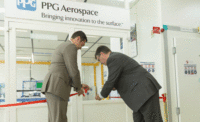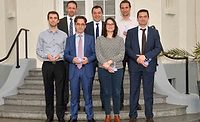Air Tractor Showcases First PPG E-Coat System for Aircraft OEM

OLNEY, TX — Air Tractor hosted aerospace industry representatives, elected dignitaries, Air Tractor dealers and members of the media at its agricultural aircraft manufacturing facilities in Olney, Texas, to see operation of the first electrocoat primer system for full-scale original-equipment aircraft parts manufacturing. Celebrating the groundbreaking event with Air Tractor officials were executives of aerospace coatings manufacturer PPG, which developed the pioneering e-coat aerospace primer system.
"This is an important day for Air Tractor and for PPG, and it is a milestone for the aerospace industry," said Air Tractor President Jim Hirsch. "E-coat is not a new metal primer application technology for corrosion resistance and paint adhesion, but it is new to aerospace. E-coat has been used in the automotive industry for 50 years. Until PPG AEROCRON™ e-coat primer was developed — the same company that introduced e-coat commercially for automotive OEM production — the technology had not been adopted by aerospace OEMs. The relatively high cure temperatures used in the automotive world can damage the structural and metallurgical properties of aluminum used in the aerospace industry. With PPG Aerocron e-coat primer, the cure temperature can be lowered to 200 degrees Fahrenheit [93.33 degrees Celsius], which makes e-coat a viable option for us."
"PPG is proud to partner with Air Tractor for this important accomplishment that will help drive the use of this innovative paint and coatings technology in the aerospace industry," said Michael McGarry, PPG Chairman and CEO. "We have opened a new chapter in aviation manufacturing, and we look forward to the industry benefitting from the protection that e-coat technologies have provided in other industries for more than 50 years."
Barry Gillespie, PPG Vice President, Aerospace Products, said, "We sincerely appreciate the confidence Air Tractor had in PPG and in this technology that is revolutionary for the aerospace industry. We were able to walk down this uncharted path together and open a new chapter in aviation manufacturing history. Partnering with Air Tractor to adapt the PPG e-coat technology that changed automotive manufacturing and is changing aircraft manufacturing is a proud accomplishment."
Gillespie recalled Air Tractor’s introduction to PPG Aerocron e-coat primer. “When PPG held its first aerospace e-coat primer symposium in June 2011 at our Oak Creek, Wisconsin, coatings facility, Rick Turner, Air Tractor’s Vice President of Operations, was intrigued but skeptical. He could not conceive how large aircraft parts could be negotiated through an automated dip-and-bake system. But the PPG Aerocron primer team found the answer. The team members, Rick and his Air Tractor team worked diligently over the next six years to make this vision a reality.”
Air Tractor's Turner supervised the design, planning and construction of the new electrocoat facility. The three-story, 6,600-square-foot building encloses the electrocoat system and includes an automated parts rack hoist, ten 5,000-gallon immersion tanks, cure ovens and a reverse osmosis water treatment system.
The new electrocoat facility began producing test parts in April 2017. Three months later Air Tractor completed testing and began introducing e-coat parts into its assembly line, Turner reported.
"The e-coat system is currently operating at 50 percent of its full production capacity. There is plenty of capacity to increase output as needed. We are e-coating various parts of the aircraft including wings, control surfaces, and skins, as well as subassemblies," Turner said. "It's a completely automated process."
The power supply and filtration for the entire electrocoat line is managed at a single control station. An automated racking system moves parts through the electrocoat bath process. When the 12-stage process is complete, the racking system loads racks of parts into ovens where the e-coat is cured. When parts leave the oven, they are ready to be moved into aircraft production or to inventory.
The quality and coverage of the electrocoated parts finish is clearly superior to the chromated pre-treatment and spray primer process, Turner noted. "E-coat provides uniform coating throughout the part, even in holes, slots and inside tubes."
Instead of primer being sprayed onto the part, which is the traditional method, the part is dipped into an electrically charged tank of primer. Based on the principle that opposites attract, electrocoating maximizes paint adhesion and provides a superior edge and surface finish with precise and consistent film thickness.
"It's very efficient," Turner added. "There is no over-spray, meaning that 90 to 95 percent of the coating adheres directly to the part."
Turner continued, "At this stage of implementation, we are seeing a significant increase in process efficiency. We are also tracking reduced material costs and improved safety and environmental impact.
"The e-coat process provides a better, longer lasting product to Air Tractor owners," said Turner. "Given the chemicals that agricultural pilots work with, we believe there will be fewer panels to replace, re-coat or repaint, meaning less maintenance costs in the long run for the life of the airplane. What's more, electrocoated parts can be easily repainted in the field with commonly used aircraft paints and spray systems."
"Air Tractor is the first original-equipment aircraft manufacturer in the United States to move to this system," reports Air Tractor’s Hirsch. "It's yet another example of how we continually work to improve Air Tractor aircraft so that they provide even better value and performance for our customers around the world."
Looking for a reprint of this article?
From high-res PDFs to custom plaques, order your copy today!







